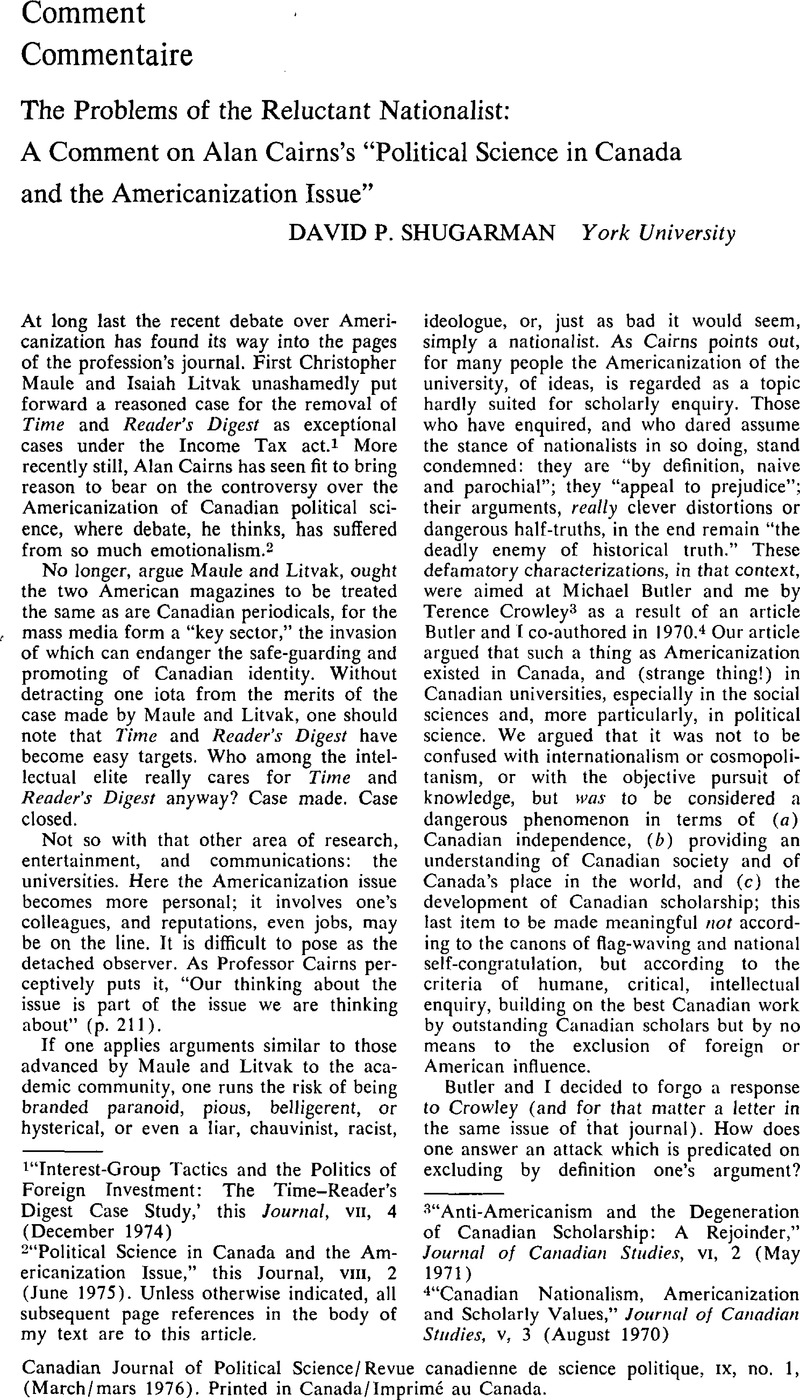No CrossRef data available.
Article contents
The Problems of the Reluctant Nationalist: A Comment on Alan Cairns's “Political Science in Canada and the Americanization Issue”
Published online by Cambridge University Press: 10 November 2009
Abstract

- Type
- Comment/Commentaire
- Information
- Canadian Journal of Political Science/Revue canadienne de science politique , Volume 9 , Issue 1 , March 1976 , pp. 121 - 126
- Copyright
- Copyright © Canadian Political Science Association (l'Association canadienne de science politique) and/et la Société québécoise de science politique 1976
References
1 “Interest-Group Tactics and the Politics of Foreign Investment: The Time-Reader's Digest Case Study,’ this Journal, VII, 4 (December 1974)
2 “Political Science in Canada and the Americanization Issue,” this Journal, VIII, 2 (June 1975). Unless otherwise indicated, all subsequent page references in the body of my text are to this article.
3 “Anti-Americanism and the Degeneration of Canadian Scholarship: A Rejoinder,” Journal of Canadian Studies, VI, 2 (May 1971)
4 “Canadian Nationalism, Americanization and Scholarly Values,” Journal of Canadian Studies, V, 3 (August 1970)
5 Though there is at least one article that Cairns seems to have missed: Ronald Blair, “Reflections on Americanization,” in Must Schools Fail, ed. Byrne, Niall and Quarter, Jack (Toronto 1972).Google Scholar Blair's argument has much in common with Crowley's: the critics of academic colonialism are spreading “dangerous nonsense”; the real danger is located not in Americanization, but in positivism. But since Blair notes that positivism has taken root most fully in the United States, and that “we are reproducing here the most notorious aspects of that approach,” he concludes his article by acknowledging that “our universities are ‘Americanized’ in the sense that they have adopted some of the worst features of American higher education.” Like Cairns, Blair is concerned with establishing some middle ground. But in the end there is not much left of the middle.
6 The attribution of “insularity” has recently been more fully analysed and expanded on by Donald Smiley and is something that Cairns also draws attention to. See Smiley's, , “Must Canadian Political Science be a Miniature Replica,” Journal of Canadian Studies, IX, 1 (Feb. 1974).Google Scholar
7 Butler and I did use some provocative phraseology. We meant to be provocative. But then we took seriously the contention that the “most subtle” form of imperialism is cultural, which aims “at the conquest of the minds of men as an instrument for changing the power relations between two nations.” Morgenthau, Hans, Politics Among Nations (New York, 3rd ed. 1962), 60–1Google Scholar
8 I am thinking of arguments advanced by people such as C.B. Macpherson, Charles Taylor, Peter Winch, Bernard Crick, Noam Chomsky, Sheldon Wolin, Eric Voegelin, Leo Strauss, C.W. Mills, and George Grant.
9 “The Electoral System and the Party System in Canada, 1921–1965,” this Journal, I, 1 (March 1968), 80
10 It is worth remembering that it was not Canadian nationalist scholars but the government of Canada that wanted to deny the entry of outstanding scholars like Gabriel Kolko and Istvan Meszaros. There is no call for retroactively penalizing foreign scholars and students who came here on invitation and have since made their homes here and made scholarly contributions to their Canadian communities. But what of the (few) hirings and curriculum matters in the immediate future? What of the obligations of the Canadian academic community to its own students?
11 To account for what is wrong in Canadian political science in terms of Americanization is “a superficial view,” according to Macpherson, : “After Strange Gods: Canadian Political Science 1973,” in Perspectives on the Social Sciences in Canada, ed. Guinsberg, T.N. and Reuber, G.L. (Toronto 1974), 64Google Scholar
12 In similar fashion it has recently been suggested by R. Cook that the evidence of exemplary “foreign influences,” either in the form of contributions by foreign professors in Canada, or on Canadian academics, is somehow a refutation of the position set out by Butler and myself. But this is not an argument against us; it is rather an indication the writer has not fully understood what we are saying. See R. Cook, “History: The Invertebrate Social Science,” in Guinsberg and Reuber, Perspectives, 136.




